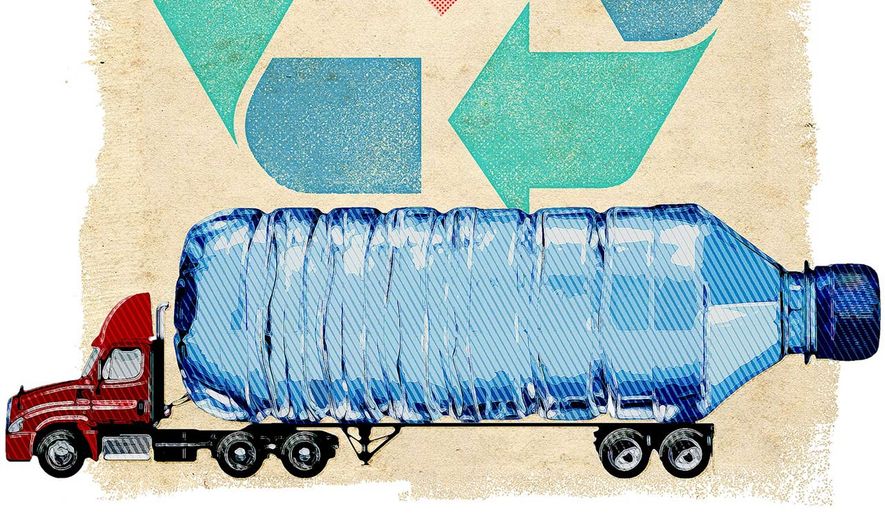OPINION:
In a recent public hearing of the Senate Environment and Public Works subcommittee on “plastics use and reducing plastic waste,” I delivered a message on behalf of our industry that may have surprised the other witnesses: We love plastic, we hate plastic waste — and we are open to well-crafted legislation that helps us reduce that plastic waste.
I shared this not only to clarify our commitment to reduce plastic waste to subcommittee Chairman Jeff Merkley, Oregon Democrat, who likely expected something different, but to verbally extend our earnest hope for legislative and policy collaboration as we begin the 118th Congress.
The message is one that we continue to reiterate and brings us together with both ends of the spectrum across the sustainability community. Our industry believes that any molecule of plastic material that leaves the economy is truly a waste. We need to recycle more, period. And we are willing to work with lawmakers on policies that will support our industry and improve plastic recycling.
At the same Senate hearing, I also stated that the plastics industry can be supportive of policies like bottle deposits or extended producer responsibility if crafted correctly. Mr. Merkley, author of the Break Free From Plastic Pollution Act, remarked — perhaps offering a second round of surprise — that “if crafted correctly means that we recycle a high amount, certainly, my door is open.”
I believe that lawmakers like Mr. Merkley convened us to have an honest discussion about the challenge of reducing plastic waste and identify ways to solve it.
Collaboration isn’t the goal for everyone, though. Environmental activists like Judith Enck, the president of Beyond Plastics, as well as those who represent the Center for the Elimination of Plastics (who, not surprisingly, have a biased perspective against our association), offered testimony at the hearing, and didn’t express a desire to work together.
Their solution is to eliminate plastics completely, which is not only unfeasible but would also collapse our economy and cause our reliance on other sources for products that are essential to everyday life. Plastics are used to keep food fresh, protect health care workers from viruses, make cars more sustainable, and help first responders during natural disasters. The plastics industry is the sixth-largest manufacturing industry in the United States, employs 1 million people and contributes $468 billion to our economy. Eliminating our industry is not only a threat to our livelihood and economic solvency, it’s a threat to our safety and national security.
Plastic has become the preferred material in most industries because it uses the least resources to manufacture and transport and provides the best performance compared with other materials. An independent report by McKinsey even found that plastics have lower total greenhouse gas contribution than alternatives. In addition, producing plastic in America is a good thing and something that should be embraced as essential, not abruptly stopped. If there’s one thing a pandemic and now a war on the European continent have taught us, stable supply chains are imperative.
Here are areas that our industry would hope to work on with congressional leaders, including Environment and Public Works Committee Chairman Tom Carper, Delaware Democrat, Mr. Merkley, and ranking member Shelley Moore Capito, West Virginia Republican, on reducing plastic waste:
- Increase investments in critical recycling infrastructure to ensure that collection, sorting and processing can keep up with the complexities of all materials in the marketplace. The Environmental Protection Agency has started its process for granting resources included in the Infrastructure Investment and Jobs Act stemming from Save Our Seas 2.0 legislation passed in 2020. It’s a great start, but more is needed.
- Promote end-market development for various plastic resins to ensure demand remains for recycled materials. A set of reasonable, attainable, and consistent nationally recognized recycled content requirements can help spur investment and guarantee markets for recyclable material.
- Encourage innovations in recycling technologies to ensure materials that cannot economically be recovered through traditional methods can still be recycled, moving us toward a more circular economy. Perhaps more importantly, I urge Congress to avoid stifling innovation and promising new technologies that are needed.
- As stated in the hearing, bottle deposits work. The plastic industry could support a program with sufficient safeguards in place to ensure unreturned fees stay within the bottle recycling system and don’t go to unrelated areas.
Plastic is not going away; it is essential. We need it in our lives. But America does not recycle enough of it. Our industry wants to recycle more, which is why companies across our industry work tirelessly to improve recyclability and invest billions of dollars into the prevention of waste and the technologies to recycle.
Working together, I know we can get these recycling rates up. “Together” is the most important part of that sentence. I hope that as the new Congress begins, the plastics industry can work with both sides of the aisle to find real solutions to recycle more plastic every day.
Just like Mr. Merkley’s, our door is open as well.
• Matt Seaholm is president and CEO of the Plastics Industry Association (PLASTICS).




Please read our comment policy before commenting.